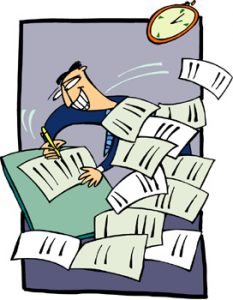 I used to have frustrated students tell me, “I should have more stories and articles accepted by now; I work ten hours per week on my writing.” That fact alone was meaningless. I didn’t know how many hours were productive hours: how much was written, how many submissions were made, etc. You want to be highly productive. You don’t want to put in a lot of time or effort with little to show for it. Productivity means having something to show for the time you invest.
I used to have frustrated students tell me, “I should have more stories and articles accepted by now; I work ten hours per week on my writing.” That fact alone was meaningless. I didn’t know how many hours were productive hours: how much was written, how many submissions were made, etc. You want to be highly productive. You don’t want to put in a lot of time or effort with little to show for it. Productivity means having something to show for the time you invest.
So, it’s important to determine if you’re being productive with your writing hours or just being busy. And it can be surprisingly difficult to tell sometimes. It’s a bigger issue than learning how to focus, although that is critical too.
Busy or Productive: Which One Are You?
Busyness is about how hard you try, how many hours you work, how stressed you are, how much you multitask, and about putting in your time. If you’re just being busy, that’s how you often describe your days when someone asks about your writing.
Productivity doesn’t care about any of that. Productivity is only measured by what you produce.
What is your concrete, measurable end result when the work day is over? Productivity is about producing something, whether it’s a stack of new rough draft pages or several files of research material. Somehow, we writers lose sight of that fact, and we tell each other how many hours we worked, or how stressful the writing was, or how long it took to work through our writer’s block, etc. None of that has anything to do with being productive.
That might sound cold-hearted, but the unknown editor you contact won’t care about any of that. It’s like when you go to the store and buy something off the shelf. You don’t care how long it took the manufacturer to produce the thing. It doesn’t matter how hard they worked on it, and you don’t care how much stress was involved; you only want to know does the product work, and if you should you buy it. All you care about is that end product. And that’s what those unknown editors, agents, and readers really care about too.
So, what concrete evidence of writing do you have at the end of the day? If you’ve had a productive writing day, you have produced something concrete.
Another Tell-Tale Sign of Productivity
There’s one other factor that distinguishes a productive writing day from a busy one. We often overlook this sign. How do you feel at the end of your writing period?
When you are stacking up pages and producing results, that’s motivating and creates momentum. It’s energizing. However, if you’re just “busy,” the same number of hours of expended effort will wear you down and make you tired instead. You will have that lethargic “why bother?” feeling. There will be nagging worries: I’m spending lots of time reading agent blogs, and networking on Facebook, and posting on Instagram, and reading books on craft, but where’s it getting me?
For the next couple of days, observe yourself and make notes about your writing time. Are you busy or productive, or a combination of both? What do you have to show for your time? How energized do you feel at the end of the day?
If you determine that too much of your time is just spent “busy,” come back on Friday for ideas to help you swap being busy for being productive.